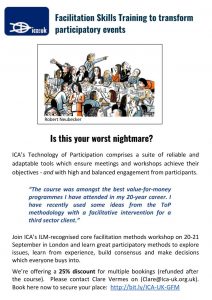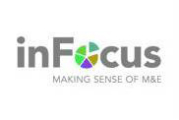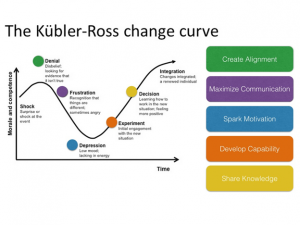Category Archives: Blog Post
Sep
Group facilitation methods training, Dublin
My colleague Miriam O’Donoghue and I are running a Group Facilitation Methods course with ICA:UK in Dublin on 1st-2nd October – some places still available. The details are here: https://www.ica-uk.org.uk/index.php?option=com_civicrm&task=civicrm/event/info&reset=1&id=207
Jul
Virtual facilitation training
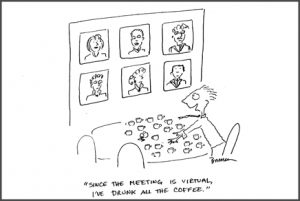
Internationally, across the public, private and voluntary sector, we spend up to 17 hours a week in meetings.
32% of all meetings are virtual (38% for employees under 35 years old)
67% of employees report that more than half the meetings they attend are not of value!
Yet what proportion of our training and facilitation budgets do we invest in making virtual meetings more engaging and productive?
Why not start with training virtual facilitators?
ICA:UK’s virtual facilitation training starts on 28th September 2017 and runs for 8 weeks. You will learn virtual facilitation skills that apply across platforms e.g. Zoom, Gotomeeting, Skype
- Learn to lead engaging online meetings that elicit innovative thinking and creative problem-solving.
- Gain competency leading virtual meetings with Adobe Connect, and ToP Focused Conversation.
- Build your confidence as a virtual facilitator.
- Learn tools and techniques for eliciting participation, virtual meeting design, and five best practices.
Learning Objectives
To develop basic skills essential to virtual facilitation, including how to use tested and proven collaboration tools:
- Adobe Connect — a flexible virtual collaboration platform where participants can build engaging meetings through the use of electronic sticky walls, virtual breakout rooms, and a variety of pods that elicit participation.
- Basecamp — a lightweight, web-based collaboration and productivity platform. Members can post messages, share links, share any kind of file, add events to a calendar, and assign tasks.
Who should attend this course?
This course is intended for anyone who is leading virtual meetings, virtual training, or webinars in the private, public or voluntary sector including Project Managers, Team Leaders, Facilitators, Trainers, Coaches, and Community Activists
Training approach
Participants experience practical, hands-on learning:
PRACTICE. Integrate learning by designing a virtual Focused Conversation with a partner, and by practising as facilitators and producers, with the rest of the class acting as participants.
COACHING. Receive one hour of one-on-one coaching from a trainer. Use the hour any way you like — to cover a topic you missed, polish a skill, or to go deeper.
FEEDBACK. Receive peer and trainer feedback during practice sessions.
CLASSROOM. Eight virtual sessions using Adobe Connect.
ASSIGNMENTS. One to two hours of assignments between sessions deepens the learning, and includes practice with a partner.
RESOURCES. Collaborate with classmates in Basecamp (no subscription needed).
Book here or contact orla@orlacronin.com for more information
Tagged | training; facilitation; workshops
Jun
Online training
I am embroiled in preparing for 2 online courses at the moment. One is the Intrac Online M&E course – we have 17 participants spanning 4 continents. We’re using Moodle as the asynchronous course platform, for discussions, homework and resources, and Blackboard Collaborate as the synchronous workshop/seminar platform.
I’m also starting to train today on an in-house Virtual Facilitation Online course with the Center for Disease control in the US, alongside with my ICA:USA colleagues Ester Mae Cox, Nileen Verbeten, Brenda Schmidt and Sheila Cooke. For this, we’re using Wiggio for the asynchronous component, and Adobe Connect for the workshops.
This is giving me a great opportunity to compare and contrast different platforms. Part of course design, in addition to creating content, is designing for learning and fostering peer interaction: this is often sacrificed in online training, but in fact, it becomes even more important to design, as it doesn’t necessarily happen naturally when people aren’t milling around drinking coffee together and chatting when they sit beside each other.
Within our training, we’re pushing ourselves to continuously model best practice in online facilitation…. to avoid webinar-induced comas!
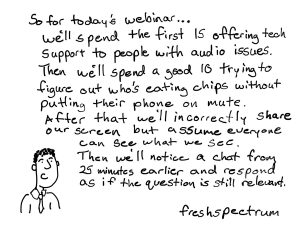
Tagged | facilitation, M&E, training, virtual facilitation
May
Intrac Online M&E course
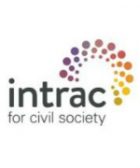
Orla is delighted to have become an INTRAC associate. She is lead trainer on the forthcoming online M&E course. This marries her skills in monitoring and evaluation, and online facilitation, beautifully, and she’s really looking forward to the next course, which starts on June 12th.
This 4 week (part time) course is aimed at participants who are relatively new to M&E. It aims to develop an understanding of the principles and practice of effective M&E, share examples of M&E approaches and tools appropriate to different types of interventions and contexts, and will help participants to tackle their own M&E challenges. Click here for a more detailed description.
The ‘synchronous’ (real time) meetings will run on Blackboard Ultra, and the asynchronous learning forum takes place on Moodle.
Click here to register for this course
Apr
Intrac Online M&E Course
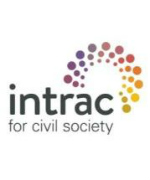
Orla is delighted to be training one the forthcoming Intrac Online M&E Course, which is now open for registration. Further information available here.
Mar
Learning co-ordinator “I define me”
I’m really pleased to be collaborating with the Cape Town based consultancy Southern Hemisphere to provide learning support to projects in South Africa, Columbia and the UK, focused on empowering young women to move away from gangs. One of the projects I’m supporting is even on my doorstep: cycling rather than flying to meet clients is a rare treat!
https://www.mmu.ac.uk/news/news-items/5315/
Dec
Free Theory of Change webinar
Date: Thursday, December 15th, 2016
Time: 9am CST / 10am EST / 3pm GMT / 4pm CET
Duration: 1 Hour
Dear webinar registrant,
Thanks for registering for Wednesdays How to create a powerful and ‘best in class’ Theory of Change webinar.
In this webinar you will learn:
- What makes a powerful and compelling Theory of Change
- Top tips on how to create a Theory of Change, including free tools and resources to take away
- How learning communities can help you to develop a ‘best in class’ Theory of Change
The webinar will also create the opportunity to connect with other similar organisations that have developed or are in the process of developing, their Theories of Change.
The event joining details follow below:
Event number: 849 183 611
Event password: TOC1
——————————————————-
To join the online event
——————————————————-
- Click here to join the online event.
Or copy and paste the following link to a browser:
https://impactinfocus.webex.com/impactinfocus/onstage/g.php?MTID=eb64ad51430370a4378eefb3adb7c3e3c
- Click “Join Now”.
——————————————————-
To join the audio conference only
——————————————————-
Call-in toll number (UK): +44-203-478-5289
Global call-in numbers: https://impactinfocus.webex.com/impactinfocus/globalcallin.php?serviceType=EC&ED=452714802&tollFree=0
Access code: 849 183 611
——————————————————-
For assistance
——————————————————-
You can contact your inFocus Host at:
tom@impactinfocus.com
Can’t join the event?
The playback of UCF (Universal Communications Format) rich media files requires appropriate players. To view this type of rich media files in the meeting, please check whether you have the players installed on your computer by going to https://impactinfocus.webex.com/impactinfocus/onstage/systemdiagnosis.php
We look forward to seeing you.
Laura Goldsmith
The Marketing Team
www.impactinfocus.com
Tagged | theory of change
Nov
There are still spaces available on ICA:UK’s Group Facilitation Methods training in Manchester on 17th -18th November, with Orla as the trainer. Booking link here
Tagged | training; facilitation; workshops
Jul
10 post-referendum coping strategies
By coincidence, a couple of weeks ago, I was researching the concept of “othering” – “to view or treat (a person or group of people) as intrinsically different from and alien to oneself”. The evolution of this concept can be traced through a number of philosophers, sociologists and pyschologists, from Hegel, through De Beauvoir, and on through Lacan, Levi-Strauss, Said, Rorty….and a search for “referendum” and “othering” shows a surge in its use. I had only been delving into the term as part of my reaction to a film, and it’s dismaying that it has become so acutely relevant so suddenly: I’ve found myself using it several times a day during the past week.
My Framework colleague Gopal shared some thoughts with us on his reactionto B***xit and this catalysed some of my own thinking on how to move beyond “othering” and create some sort of functioning vision for the future. Many models of change and shock (e.g. the Kubler Ross change model – thanks, Gopal), and Otto Sharmer’s Theory U emphasise the importance of taking time to reflect and conduct ‘deep listening’, and then moving on to experimentation.
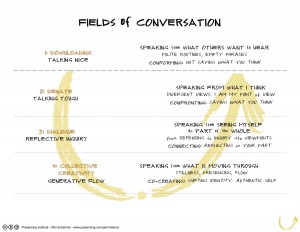 It’s been interesting to notice, among all the noise, some really tangible initiatives around – ideas, experimentation, prototyping and implementation, all with the goal of building community cohesion and resilience, and ensuring that voices are heard from all parts of society. Some of these are a resurgence of interest in tools and techniques which have existed for many years; others are very new. The themes which seem to be emerging are, firstly, how to have meaningful conversations characterised by empathic listening across a gulf such as the one which has opened between ‘Remain’ and ‘Leave’ and secondly, how to turn those conversations into a form of democracy, widening the term beyond ‘representational democracy’, to participative and deliberative democracy? Here are a few initiatives which caught my eye:
It’s been interesting to notice, among all the noise, some really tangible initiatives around – ideas, experimentation, prototyping and implementation, all with the goal of building community cohesion and resilience, and ensuring that voices are heard from all parts of society. Some of these are a resurgence of interest in tools and techniques which have existed for many years; others are very new. The themes which seem to be emerging are, firstly, how to have meaningful conversations characterised by empathic listening across a gulf such as the one which has opened between ‘Remain’ and ‘Leave’ and secondly, how to turn those conversations into a form of democracy, widening the term beyond ‘representational democracy’, to participative and deliberative democracy? Here are a few initiatives which caught my eye:
1. The Kumi method for conflict transformation, in which some of my ICA:UK colleagues collaborated
2. Compassionate Listening engages participants in processes that “have each side seeing the humanity of the other, even when they disagree”. This approach was developed for peacebuilding in areas of acute conflict, but it now feels very relevant closer to ‘home’ (whatever ‘home’ means these days)
3. I hadn’t heard of Neighbourhood Plans before now, but they have statutory status, are developed by a group of citizens, and are concerned with local issues such as housing, transport, amenities. They have to be considered by the local authority (the legislation was introduced in 2011) and so they are a forum which goes beyond passive ‘consultation’ to more active co-creation. Some low tech tools for planning are available here
4. In Spain, Podemos have been particularly active in involving citizens in the development and running of their movement, using both face to face and online collaboration tools. The latter include using Agora Voting to shortlist their MEP candidates and using Appgree and Loomio for idea testing and decision making (Podemos have also been involved in piloting D-Cent, below)
5. The RSA launch the Citizens Economic Council next week. This is a project examining the connection between lay economic thinking and economic policy by enabling citizens to deliberate and make recommendations on future economic priorities.
6. So say Scotland is an online hub for innovation around democracy in Scotland. They use story telling, game playing, and citizens assemblies to “broaden participative and deliberative democracy as a compliment to and an evolution of representative democracy”, inspired by Iceland’s ‘Anthill’ assembly in 2009. It seems to have gone little quiet at the moment on the web, though the Facebook page is active
7. Nesta have funded D-CENT (Decentralised Citizens Engagement Technologies), which is a platform and a set of tools to enable citizen engagement. Pilots will run with existing user communities to gather knowledge and test the platform, but the system is open to movements anywhere starting to test and use the software. It is being piloted in Spain, Iceland, and Finland by organisations such as the 15M citizen movement, Citizens Foundation, Better Reykjavik and Better Iceland, and Open Ministry, a crowdsourcing site linked to the Finnish parliament. Whoops, this is a European project – what will happen to projects like these now?
8. Crowdpac, in addition to providing very detailed ‘ideological mapping’ of political candidates to make it easier to decide how to vote, also provides ‘micro delibration’ for the individual to help them work out where they actually stand, before casting their vote. This helps us to move beyond personality politics and make more informed decisions (the intention is that Crowdpac will also work to create more diversity among candidates for political office by facilitating crowdfunding for campaigns).
9. Participatory budgeting is gaining traction. Scotland’s ahead of the game here too (this post was *not* written by our Scottish Frameworker, honest!). The aim of participatory budgeting is to “address inequalities in service provision and resource allocation, engage and empower citizens in discussions on public budgets and stimulate co-production and mutual responsibility between citizens and the state”.
9.5 I confess I was stuck for #10 so I turned to one of my favourite blogs, From Poverty to Power, to see whether there might be a glimmer of light. There I found an interesting analysis of the implications of the referendum for development and aid, and a wonderful neologism, “straw clutchism”, which may be what I’m doing!
10. And then, just as I was going to post with 9½ thoughts, I received a message via one of my ICA:UK colleagues. Involve, the thinktank and charity specialising in public participation with a mission to “deepen democracy”, have issued a shout out for facilitators to “explore the different ways that we might work together to make the post-referendum debate more productive; and to provide a space for people with facilitation and engagement skills to learn more about each other and spark productive partnerships”. The mooted date for a first meeting is 22nd July.
Maybe something can be built from the ashes?
Tagged | consultation, deliberative, participation, participatory
